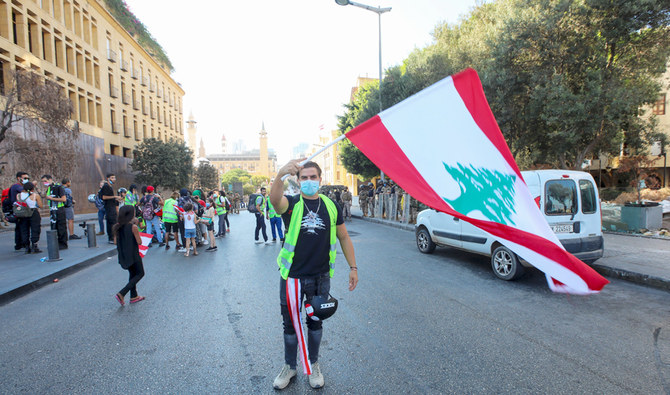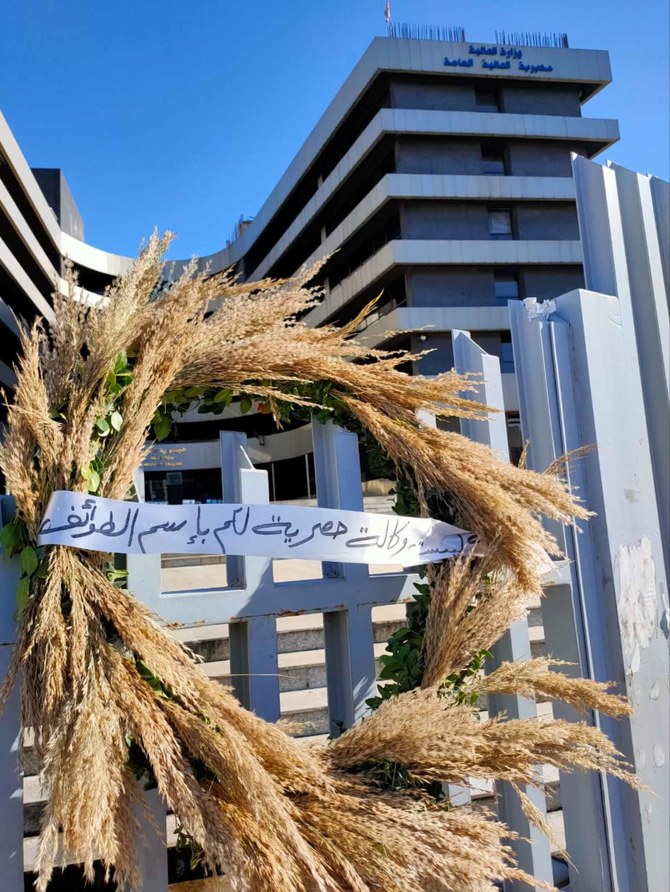
by cbc.ca -- A Lebanese prosecutor filed charges on Tuesday against current and former customs officials over the massive blast at Beirut's port in August, including a former customs chief who was reportedly the point man for the militant Hezbollah group at the facility. State prosecutor Ghassan Khoury charged senior customs official Hani Haj Shehadeh and former customs chief in Beirut, Moussa Hazimeh, according to the state-run National News Agency. The report didn't reveal the charges or give additional details. Hazimeh was reportedly the point man for Hezbollah at the Port of Beirut when a massive amount of highly explosive fertilizer was stored there more than six years ago. Nearly 2,500 tonnes of ammonium nitrate blew up Aug. 4, killing more than 200 people, injuring thousands and causing damage worth billions of dollars, mostly in nearby neighbourhoods.
Beirut's port is considered one of the most corrupt institutions in the country, where ruling political factions including Hezbollah have divvied up positions and created fiefdoms. National News Agency said that in charging Shehadeh and Hazimeh, the number of those now charged in connection with the explosion reached 33, of whom 25 are under arrest. None of the charges have been made public and the process has been highly secretive. Riad Kobaissi, an investigative reporter with Al Jadeed TV, has followed corruption at the port and within the customs authorities since 2012. He said all the political factions in the country benefited from using the port as patronage, and most overlooked dubious dealings. He said many people knew of the initial warning about the danger of the stored ammonium nitrate in 2014 by a customs official. He said that includes Hazimeh, who Kobaissi described as Hezbollah's former point man at the port.

By Hugo Miller -- bloomberg -- Carlos Ghosn’s detention for almost 130 days in a Japanese jail was neither necessary nor reasonable and violated the former Nissan Motor Co. chairman’s human rights, a UN panel concluded in a harsh critique of Tokyo prosecutors who led the case against him. The decision to arrest Ghosn four times in a row so as to extend his detention was “fundamentally unfair,” the United Nations Human Rights Council’s Working Group on Arbitrary Detention said in a report Monday posted on its website. The panel said that it would refer the case to the UN’s rapporteur on torture, cruel and other inhuman or degrading treatment. “The repeated arrest of Mr. Ghosn appears to be an abuse of process intended to ensure that he remained in custody,” the panel said, pointing out that on at least two occasions he was arrested for the same alleged crime, only for a different time period. “This revolving pattern of detention was an extrajudicial abuse of process that can have no legal basis under international law.” Ghosn and former Nissan director Greg Kelly were arrested in Tokyo on Nov. 19, 2018, and accused of underreporting the former chairman’s compensation. Both have denied wrongdoing. Additional charges were filed later accusing Ghosn of using company assets improperly, which he has also denied.
Ghosn made a daring escape from Japan to Lebanon hidden inside a large box aboard a private jet in late December. It was, Ghosn argued defiantly in Beirut later, the only way for him to avoid what he called trumped-up charges of financial misdeeds concocted with the help of his former Nissan colleagues. His arrest and removal as chairman of Nissan, Renault SA and Mitsubishi Motors Corp. shook the foundations of the automaking alliance he built and triggered management and operational turmoil. While Ghosn is unlikely to ever face trial or detention in Japan, the report could be relevant for several ongoing legal proceedings related to the former auto executive. The most immediate potential impact may be on the impending extradition from the U.S. of former Green Beret Michael Taylor and his son Peter, who are sought by Japanese prosecutors for their role in helping Ghosn escape the country.

BEIRUT: A Lebanese academic has warned politicians that the country is at risk from the group Hezbollah, despite various factions coming together to try to launch a rescue initiative, as it struggles to resolve a myriad of crises currently affecting the eastern Mediterranean state. There has been no progress yet on the formation of a new government since the collapse of the previous administration in August, and consequently, no negotiations with the International Monetary Fund over a bailout. American economist Steve Hanke said in a tweet on Monday: “While Venezuela continues to hold the top spot in my world inflation table, Lebanon has finally passed Zimbabwe for 2nd place. It’s rather shocking to watch Lebanon’s politicians fiddle, while Beirut burns.” The inflation rate in Lebanon has now reached around 365 percent.
In light of this stalemate, during a press conference at the Palace of Justice in Beirut on Monday, trade unions, universities, economic organizations, labor bodies and civil society forces launched a national rescue initiative under the slogan “Recovering the State,” while joint parliamentary committees will meet on Wednesday to discuss a new electoral law. The head of the Beirut Bar Association, Melhem Khalaf, said in the press conference: “We want to restore the state by reconfiguring the authority to rebuild the country.” Khalaf added: “The initiative is easy to implement and relates to the size of people’s pain, and is open to constructive discussion in a way that reassures all concerns.” The head of the North Bar Association, Mohammed Al-Murad, explained the details of the rescue initiative. He said that the initiative “includes the necessity to form an effective, purposeful, fair and reliable government of independent specialists with specific and limited legislative powers within a specific time frame.” He added: “Government priorities should an endorsement approving the start of implementing a financial, economic and social rescue plan, achieving full justice for the explosion at the Beirut Port and the implementation of a national plan to combat the coronavirus disease pandemic and limit its spread.”

by arabnews.com -- NAJIA HOUSSARI -- BEIRUT: Many national celebrations for Lebanon’s 77th Independence Day on Sunday were canceled amid the coronavirus pandemic, the political divide, the economic downturn and the aftermath of Beirut’s port blast on Aug. 4. However, several wreaths were laid on the graves of several independence statesmen, while Army Commander in Chief General Joseph Aoun laid a wreath on the memorial statue of the Lebanese Army martyrs. The civil movement celebrated the day in a different way, suspending brooms and wreaths of basil on the walls of public institutions such as the headquarters of the government, the parliament, the Ministry of Economy, the Bank of Lebanon, the Ministry of Health, the Ministry of Finance, the Palace of Justice, the Ministry of Foreign Affairs, Electricity of Lebanon, the Association of Banks and the Port of Beirut. Basil wreaths are usually placed on the graves of the dead but these carried the demands of the protesters. “We chose this way of expression as we are unable to take to the streets again because of the COVID-19 pandemic. We are sending a clear message to officials that true independence will only be achieved by returning state institutions to the people who are the source of all powers. We wanted to mourn the corrupt authority,” activist Mahmoud Fakih told Arab News.
The Lebanese fear the collapse of their state in the light of corruption, the quotas that hinder the formation of the government and the failure to achieve the reforms required to support Lebanon from abroad. The chaos surrounding Lebanon’s economic crisis has deepened after international firm Alvarez & Marsal terminated its contract to audit the central bank’s accounts. On Sunday, the black market exchange rate for dollars in Lebanon soared to more than 8,400 Lebanese pounds to the dollar. Many activists expressed their indignation on social media. Lawyer and activist Nizar Siagha wrote on Twitter: “The independence of the people from the leaders that have transformed the state into a fiesta is the independence for which we are fighting today, the independence of equality, justice and solidarity without discrimination.” Dr. Suzanne Hosri, a researcher at the Issam Fares Institute for Public Policy and International Affairs at the American University of Beirut, wrote: “This year, I refuse to celebrate or even mention Independence Day. There is no independence before the liberation of the homeland from the corrupt and failed system. There is no sovereignty before holding leaders across the sectarian spectrum accountable for our fear, disease and death. There is no freedom before breaking the shackles of our intolerance and sectarianism toward an open and responsible citizenship capable of defending its dignity and rights. No to a fake and misleading Independence Day!”
Khazen History


Historical Feature:
Churches and Monasteries of the Khazen family

St. Anthony of Padua Church in Ballouneh
Mar Abda Church in Bakaatit Kanaan
Saint Michael Church in Bkaatouta
Saint Therese Church in Qolayaat
Saint Simeon Stylites (مار سمعان العامودي) Church In Ajaltoun
Virgin Mary Church (سيدة المعونات) in Sheilé
Assumption of Mary Church in Ballouneh
1 - The sword of the Maronite Prince
2 - LES KHAZEN CONSULS DE FRANCE
3 - LES MARONITES & LES KHAZEN
4 - LES MAAN & LES KHAZEN
5 - ORIGINE DE LA FAMILLE
Population Movements to Keserwan - The Khazens and The Maans
ما جاء عن الثورة في المقاطعة الكسروانية
ثورة أهالي كسروان على المشايخ الخوازنة وأسبابها
Origins of the "Prince of Maronite" Title
Growing diversity: the Khazin sheiks and the clergy in the first decades of the 18th century
Historical Members:
Barbar Beik El Khazen [English]
Patriach Toubia Kaiss El Khazen(Biography & Life Part1 Part2) (Arabic)
Patriach Youssef Dargham El Khazen (Cont'd)
Cheikh Bishara Jafal El Khazen
Patriarch Youssef Raji El Khazen
The Martyrs Cheikh Philippe & Cheikh Farid El Khazen
Cheikh Nawfal El Khazen (Consul De France)
Cheikh Hossun El Khazen (Consul De France)
Cheikh Abou-Nawfal El Khazen (Consul De France)
Cheikh Francis Abee Nader & his son Yousef
Cheikh Abou-Kanso El Khazen (Consul De France)
Cheikh Abou Nader El Khazen
Cheikh Chafic El Khazen
Cheikh Keserwan El Khazen
Cheikh Serhal El Khazen [English]
Cheikh Rafiq El Khazen [English]
Cheikh Hanna El Khazen
Cheikha Arzi El Khazen
Marie El Khazen